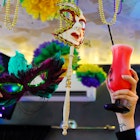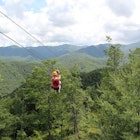

Fiddle me this: Asheville's lively busking scene brings music to outdoor locations across the city В© Gingo Scott / Shutterstock
In Asheville, music is fuel for the city, integrated into every aspect of local culture. Here in western North Carolina, surrounded by the Blue Ridge Mountains, nearly 30 music venues service AshevilleвҖҷs artsy community. YouвҖҷll discover music in unusual places, from concert venues in junkyards to recording studios in churches.
One Friday night, I find live music aboard a trippy purple bus that cruises through the streets of Asheville. ItвҖҷs part of the to several local breweries, with a live band on board to soundtrack the experience. ThereвҖҷs enough room to fit a full four-piece band complete with keyboard and drum set. On this particular night, the band is local favorite , playing a ferocious set of funky covers and high-octane originals.

вҖҳMusic is everywhere,вҖҷ says Jessica Tomasin, studio manager at AshevilleвҖҷs . One of the premier studios in the region, itвҖҷs located inside a repurposed 1926 Methodist church building and has recorded albums from a host of big names including The Avett Brothers, Band of Horses, The War on Drugs, and Widespread Panic. вҖҳFor a town as small as we are, the amount of talent and resources we have here is pretty incredible,вҖҷ she says. вҖҳPeople come here for music.вҖҷ
Asheville: a music city in the making
In recent years, the Asheville music scene has expanded from its traditional folk/mountain music base to encompass rock, soul, pop, hip hop, classical and more. Many have begun to liken Asheville to the early days of larger and more well-known American music cities like Nashville and Austin, a comparison that Tomasin largely views as valid. вҖҳSo many people involved in music are moving here all the time,вҖҷ she says. вҖҳI think thatвҖҷs only going to continue to grow.вҖҷ
Nashville is known for country and Austin is more famous for its South By SouthwestвҖ“fueled rock scene. But what separates Asheville from those other music cities, according to Tomasin, is the variety. вҖҳIf you come here and youвҖҷre a fan of any type of music, youвҖҷll find it,вҖҷ says Tomasin.
I am astounded at the number of quality live performances in a single weekend in Asheville, from electronic act Toro y Moi and hip-hop luminaries Atmosphere at (named one of the top five venues in America by Rolling Stone) to local punk bands playing in , a gloriously eclectic venue in the funky West Asheville neighborhood. It feels like a music festival is in town. But itвҖҷs just another weekend in Asheville.

Taking it to the streets: AshevilleвҖҷs busking scene
Even outside the clubs, the music never stops. Asheville offers unique venues where bands play during brunch, music shops that offer sound healing baths, and a long-running weekly downtown drum circle. Perhaps the most iconic part of the Asheville music scene is its busking community, one of the most vibrant street performance scenes in the nation. ItвҖҷs where many local musicians get their start.
Asheville is home to an organized advocacy group called the that works with the local city government to help maintain AshevilleвҖҷs reputation as a welcoming place for street performers. On any given day, youвҖҷll find a wide range of free performers on many downtown streets throughout the compact, pedestrian-friendly city. For many visitors, this is an essential aspect of AshevilleвҖҷs charm.

For many street performers, itвҖҷs the reason why they live and work in Asheville. , one of AshevilleвҖҷs most famous street performers, went from hopping freight trains across America to earning a living as a full-time spoon-playing street performer in Asheville. After busking in Nashville for a couple of years, the Wichita native moved to Asheville in 2013. What makes Asheville different from other cities in which sheвҖҷs performed?
вҖҳIn Asheville, they view street performance as community, not a commodity,вҖҷ Abby says. вҖҳAsheville really takes the time to generate a permit-free street performance scene.вҖҷ Another unique aspect of the local busking community is the unspoken вҖҳtwo-hour ruleвҖҷ, in which an individual performer will only play two hours at a given location to allow time for other performers. In other cities, Abby says, buskers often monopolize a location for the entire day and refuse to move until forced to by police.
Recently, a of Abby playing the spoons on a song called вҖҳAngels In HeavenвҖҷ on the porch of her trailer outside Asheville with fellow performer Chris Rodrigues went viral and attracted over 10 million views on YouTube, which led to a recent of the duo on the cover of The Washington Post Magazine. Abby the Spoon Lady also hosts a weekly show on the local volunteer-run non-profit radio station (which hosts dozens of music shows) called вҖҳBusker BroadcastвҖҷ, in which busker-related issues are discussed.
From up-and-comers to established acts
Asheville is home to a diverse array of musicians: big-name legends like Gladys Knight, up-and-coming indie rock stars like Angel Olsen and folk icons Steep Canyon Rangers. Asheville also helped inspire the recent Broadway musical , co-written by Steve Martin and Edie Brickell, as well as the award-winning street performance documentary .
The city is also a music festival paradise, with a range of year-round options including the classical, the African/Caribbean-flavored , the rock-focused and festivals as well as the , which takes place in a spectacular natural setting at AshevilleвҖҷs opulent Biltmore Estate (the largest privately owned home in the US). AshevilleвҖҷs annual is the longest continuously running music festival in America. In addition, since 2018, the city has hosted the popular , which explores how music and art can influence social change. In the words of their website, you leave the festival вҖҳwith more than just a hangover.вҖҷ

Moog to the music: AshevilleвҖҷs electronic history
Asheville plays a vital role in the electronic music community as the home of the . Robert Moog, a longtime Asheville resident, was the inventor of the first commercial synthesizer in 1964 and a pioneer in the global development of electronic music. The downtown Asheville facility is open for free tours, where you can watch as staff assemble the complex instruments by hand.
Outside of AshevilleвҖҷs downtown, the music continues to flow into AshevilleвҖҷs more recently developed River Arts District located along the French Broad River. A pair of unique concert venues await music lovers: a delightful wooden shack called , where bands perform most nights, and the newer . The latter, an expansive former junkyard space, hosts indoor and outdoor concerts as well as several on-site bars serving up fresh local Asheville brew (the city is also known as one of the biggest craft beer cities in America).

So between the beer, the music, the mountains and the friendly vibes, Asheville is a hard place not to like. And with the governor of North Carolina recently declaring 2019 вҖҳвҖҷ across the state, thereвҖҷs never been a better time for music fans to come discover it for themselves. As Tomasin says of the bands that come to her studio to record albums: вҖҳThey come as clients and leave as friends.вҖҷ The same could be said for just about any visitor to this idyllic mountain community.
Jay Gentile traveled to Asheville with assistance from . ПгёЫБщәПІКјҙКұҝӘҪұ contributors do not accept freebies in exchange for positive coverage.
Explore related stories

Art and Culture
9 US cities that do DГӯa de Muertos right and when to go in 2022Sep 28, 2022 вҖў 7 min read

 Cocktails6 places to celebrate Mardi Gras if you canвҖҷt make it to New Orleans
Cocktails6 places to celebrate Mardi Gras if you canвҖҷt make it to New OrleansFeb 13, 2020 вҖў 5 min read
 Festivals & EventsFestival alternatives if you can't make it to Coachella in 2020
Festivals & EventsFestival alternatives if you can't make it to Coachella in 2020Jan 28, 2020 вҖў 4 min read


 BooksGreat reads from ПгёЫБщәПІКјҙКұҝӘҪұ: "A ticket to Vienna" by Ann Patchett
BooksGreat reads from ПгёЫБщәПІКјҙКұҝӘҪұ: "A ticket to Vienna" by Ann PatchettOct 22, 2024 вҖў 8 min read




